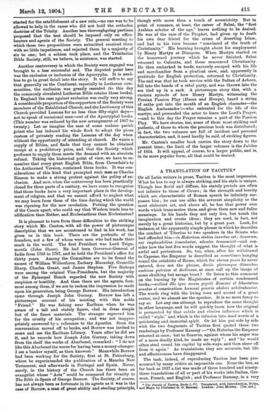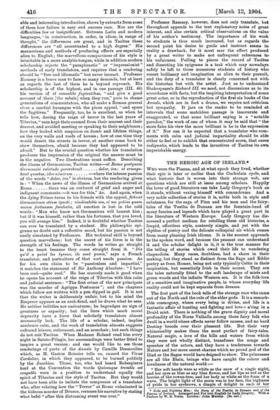A TRANSLATION OF TACIT17S.*
Or all Latin writers in prose, Tacitus is the most impressive. What be has to say is always striking, and his style is unique. Though less florid and diffuse, his stately periods are often not inferior to those of Cicero ; in the strength and brevity which are characteristic of Roman speech he infinitely sur- passes him ; be can use alike the severest simplicity or the most elaborate art, and above all, he has that power over words which transmutes them and gives them new and fuller meanings. In his hands they not only live, but touch the imagination and create ideas ; they are used, in fact, not merely by a great historian, but by a great poet. Look, for instance, at the apparently simple phrase in which he describes the conduct of Tiberius to two speakers in the Senate who had offended him—in Haterium statim invectus est ; Scaurum, cui implacabilius irascebatur, silentio transmisit—and con- sider how the last five words suggest the thought of what is awful and portentous. So, too, when, after his withdrawal to Capreae, the Emperor is described as sometimes hanging round the outskirts of Rome, which for eleven years he never entered, does not the phrase, devils plerumque itineribus ambiens patriam et declinans, at once call up the image of some skulking but savage beast ? Or listen to this comment on the burning by the Magistrates of certain condemned books,—scilicet illo igne vocem populi Romani et libertatem senatus et conscientiam humani generis aboleri arbitrabantur. The words ring with the living tone and accent of a great orator, and we almost see the speaker. It is no mere fancy to say so. Let any one attempt to reproduce the same thought in other language, and be will quickly learn how the original is permeated by that subtle and elusive influence which is called "style," and which is the infusion into dead words of a quickening and immortal spirit. Or let him put side by aide with the two fragments of Tacitus first quoted these two renderings by Professor Ramsay :—" On Haterius the Emperor retorted at once; but to Scaurus, against whom his anger was of a more deadly kind, he made no reply " ; and "he would often steal round his capital by side-ways, and then sheer off from it again." As translations they are accurate, but life and effectiveness have disappeared.
The task, indeed, of reproducing Tacitus has been pro- nounced by many critics an impossible one. None the less, as far back as 1837 a list was made of three hundred and ninety- three translations of all or part of his works into Italian, Ger- man, French, and English ; and Professor Ramsay, in a very
• The Annals of Tacitus, Books 1.-17.1. Translated, with Introduction, Notes, and Maps, by Professor G. G. Sammy. London : John Murray. [1.5s. net.]
able and interesting introduction, shows by extracts from some of them bow failure is easy and success rare. Nor are the difficulties few or insignificant. Between Latin and modern languages, in construction, in order, in idiom, in range of thought," the differences are great, and in Tacitus these differences are "all accentuated to a high degree." His mannerisms and methods of producing effects are especially alien to English ; the marvellous compactness of his style is inimitable in a more analytic tongue, while in addition modern scholarship rejects the "paraphrastic" or " impressionist " methods of early translators, and requires that a rendering should be "free and idiomatic" but never inexact. Professor Ramsay is a brave man to face so many demands, but at least as regards the last of them he is beyond reproach. His scholarship is of the highest, and in one passage (III. 46) his version of et con-sulite fugientibus, "and give a good account of them [the rebels] when they run," puts to shame generations of commentators, who all make a Roman general close a martial harangue with the pious appeal, "and spare the fugitives." Frequently, too, he is excellent, as when he tells how, during the reign of terror in the last years of Tiberius, " men kept their counsel from their nearest and their dearest, and avoided meeting or speaking to their neighbours ; bow they looked with suspicion on dumb and lifeless things, on the very walls and roofs of houses ; how at one time they would desert the streets in terror, at another come back to shew themselves, afraid because they had appeared to be afraid." But to the crucial question whether his translation produces the impression of the original the answer must be in the negative. Two illustrations must suffice. Describing the illness of Germanicus, Tacitus writes—at Rom& postquara Germanici valetudo percrebruit dolor, ira: et erumpe.
bant questus, ideo nimirum —where the intense passion
of the words "dolor, ira" is obvious, but the rendering given is : "When the news of the illness of Germanicus arrived at Rome there was an outburst of grief and anger and indignant comments :—it was for this," 8:c. And again, when the dying Prince turns to his friends with the appeal, jlebant Germanicum etiam ignoti ; vindicabitis vos, si me potius guam means fortunam favebatis, all emotion is lost in the cold words : "Men who know not Germanicus will lament him ; but if it was himself, rather than his fortunes, that you loved, you will avenge him." Indeed, it is doubtful whether Tacitus can ever be translated by a student. His philosophic epi- grams no doubt suit a reflective mood, but his passion is not easily simulated by Professors. His technical skill is beyond question marvellous ; but the secret of his force is in the strength of his feelings. The words he writes go straight to the heart because they come straight from it. "Des Dal a peint lee tyrans, its sant punis," says a French translator, and portraiture of that sort needs passion. As for his own claim to be "passionless and impartial," it matches the statement of Sir Anthony Absolute : "I have been cool—quite cool." He has scarcely made it good when he opens his account of the reign of Tiberius with this calm and judicial sentence : "The first crime of the new principate was the murder of Agrippa Postumus "; and the chapters which follow are written with a pen dipped in gall. It is not that the writer is deliberately unfair, but to his mind the Emperor appears as an arch-fiend, and he draws what he sees. He neither belittles nor caricatures; he begrudges no sign of greatness or capacity; but the lines which mark moral depravity have a force that scholarly translators almost necessarily lack. The life of a scholar, indeed, implies academic calm, and the work of translation almosts suggests cultured leisure, retirement, and an armchair; but such things do not suit Tacitus. When Madame Roland read him every night in Sainte-Pelagie, her surroundings were better fitted to inspire a great version : and one would like to see those renderings of parts of the Annals by Camille Desmoulins which, as M. Gaston Boissier tells us, caused the Vieux Cardelier, in which they appeared, to be burned publicly by the Jacobins. Those, too, who had heard Robespierre hurl at the Convention the words Quiccmque tremble eel coupable were in a position to understand equally the spirit of Tiberius and the style of Tacitus. But they would not have been able to imitate the composure of a translator who, after relating how the " Terror " at Rome culminated in the hideous murder of Drusus, resumes his narrative by stating what befel "after this distressing event was over."
Professor Ramsay, however, does not only translate, but throughout appends to the text explanatory notes of great interest, and also certain critical observations on the value of his author's testimony. The importance of his work to students is thus much increased, but as regards the- second point his desire to guide and instruct seems in reality a drawback, for it must mar the effect produced by a great writer to make not unfrequent references to. his unfairness. Pulling to pieces the record of Tacitna and dissecting his epigrams is a task which may nowadays. safely be left to those numerous students of history who resent brilliancy and imagination as alien to their pursuit, and the duty of a translator is clearly concerned not with the historian but with the artist. Just as to understand Shakespeare's Richard IlL we need, not discussions as to its accordance with facts, but the inspiring interpretation of some great actor, so in the reproduction of the first six books of the Annals, which are in fact a drama, we require not criticism but sympathy. It jars on the reader to be reminded at intervals that some matchless passage is inaccurate and exaggerated, or that some brilliant saying is a "notable paradox," the work of one of whom it may be said that "the' more false his view the more brilliant is he in the expression of it." Nor can it be expected that a translator who com- ments with calm and judicial impartiality should be able either to feel or to exhibit that concentrated scorn, that mem; indignatio, which lends to the invectives of Tacitus its own imperishable energy.











































 Previous page
Previous page